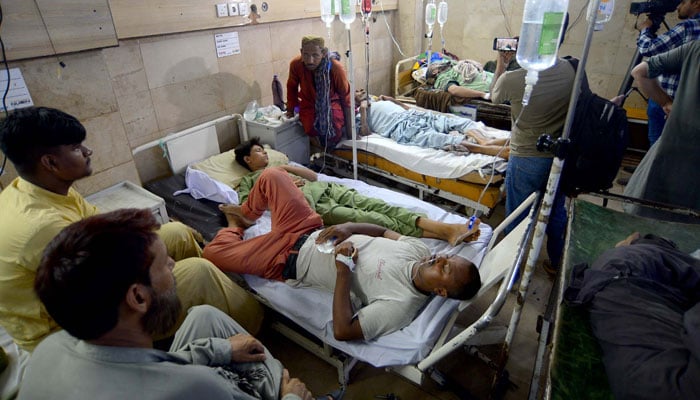Dengue, Malaria, other viral infections rise in Karachi
At least 1,724 dengue cases reported in Sindh this year including 1,484 from Karachi, says Sindh Health Dept
KARACHI: Hospitals in the port city have received an overwhelming number of patients complaining of cold, fever and body ache as cases of vector-borne diseases such as dengue, malaria, chikungunya and other viral infections increase.
According to medical experts, both the Jinnah Postgraduate Medical Center (JPMC) and Civil Hospital are receiving at least 50 patients on a daily basis.
The Sindh Health Department told Geo News that at least 411 suspected cases of chikungunya were reported in the province, while 153 among those were confirmed after diagnosis.
At least 1,724 cases of dengue were reported in Sindh this year of which 1,484 were documented in Karachi alone, it said. One death due to dengue fever was also reported in Sindh this year, the department added.
The health department further stated that at least 2,22,239 cases of malaria were reported in Sindh this year with 1,768 diagnosed in Karachi.
Cases of chikungunya, too, have been on the rise in the city with several patients flocking to hospitals and doctors with the infection's symptoms.
Geo News, however, learnt from sources that chikungunya testing kits were not available in government hospitals as number of cases skyrocket across medical centres.
When asked about the symptoms of the viral infections, Agha Khan Hospital family physician Dr Bilal Aheed told Geo.tv people experiencing high-grade fever, body aches, joint pain, and swelling or redness on the skin.
"These symptoms are often linked to viral fevers such as dengue and chikungunya, which are spread by a type of mosquito called Aedes," said the doctor when responding to Geo.tv.
Specifically, Aedes aegypti and Aedes albopictus mosquitoes are responsible for transmitting these viruses, he added.
According to the family physician, these mosquitoes thrive in urban areas and breed in stagnant water, such as open containers, puddles, or water tanks.
How to prevent vector-borne, viral diseases?
The doctor shared the following measures to ensure prevention of the aforementioned diseases:
- Eliminate stagnant water around your home.
- Keep water containers tightly covered.
- Use mosquito repellents and bed nets.
- Wear long-sleeved clothing, especially in the early morning and evening hours when mosquitoes are most active.
-
Jelly Roll explains living with 'severe depression'
-
Charli XCX reveals ‘confusing’ toll ‘Brat’ popularity took on her
-
Margot Robbie opens up about imposter syndrome ‘crisis’
-
Hailey Bieber reveals how having ovarian cysts is 'never fun'
-
Sir Elton John details struggle with loss of vision: 'I can't see'
-
What we know about Chris Cornell's final hours
-
5 famous celebrities who beat cancer
-
Oprah Winfrey talks about weight-loss 'tool to manage' health












